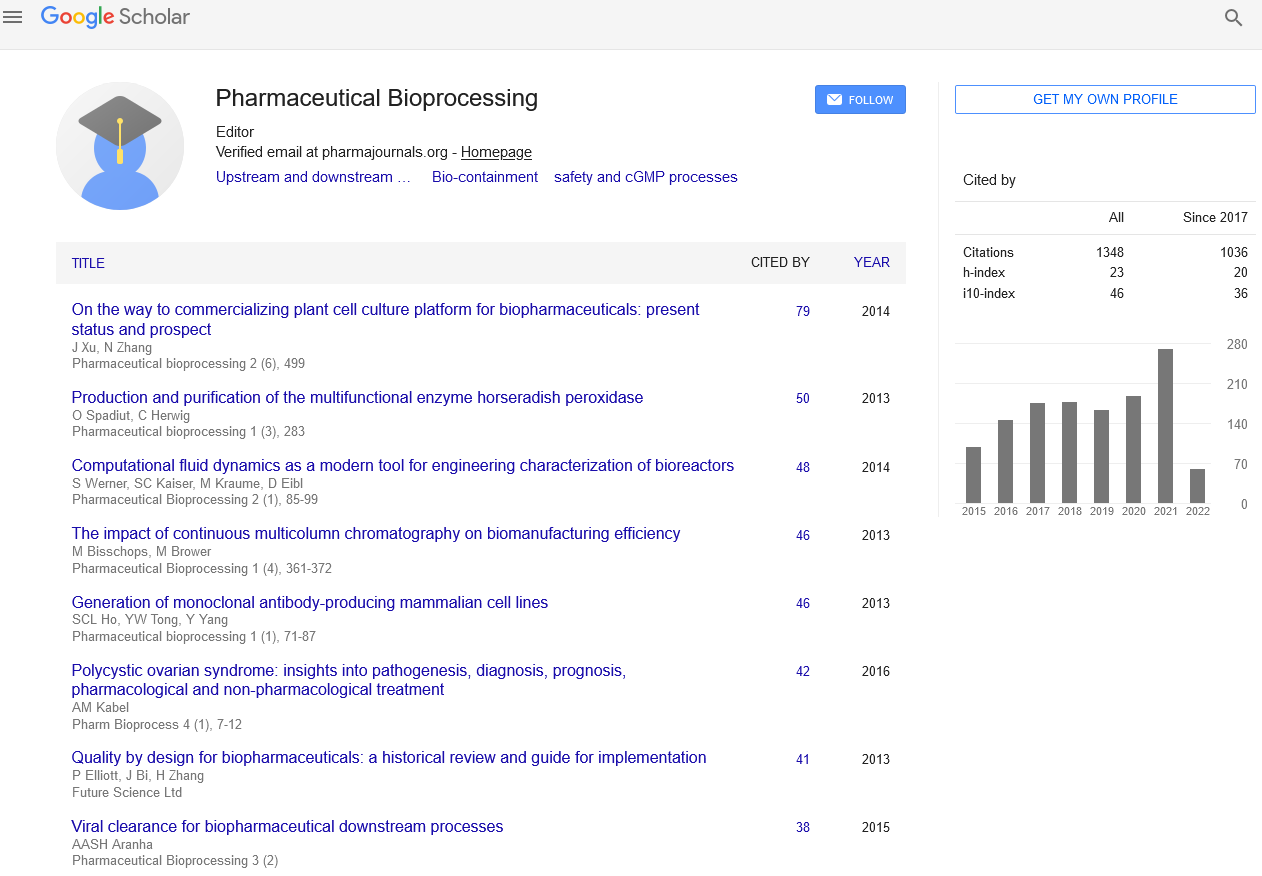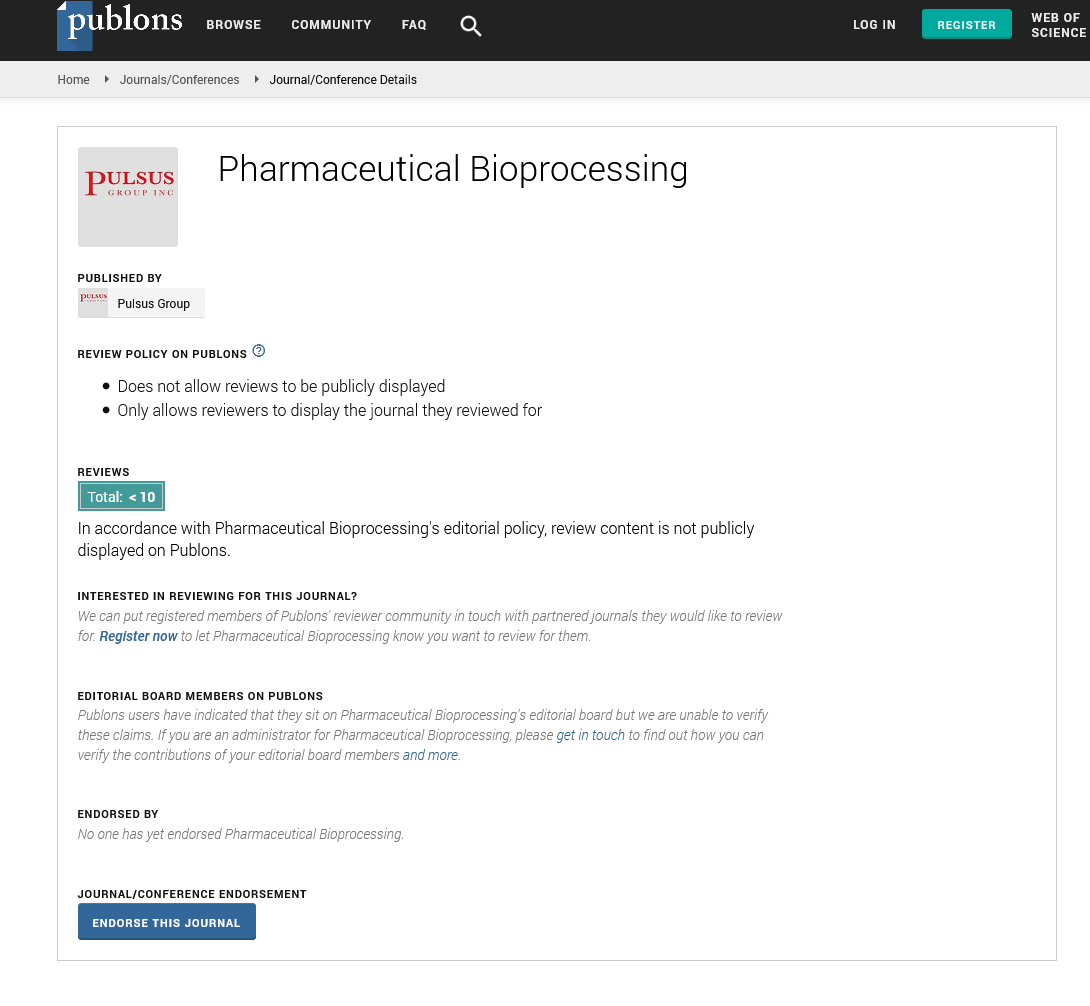Perspective - Pharmaceutical Bioprocessing (2024) Volume 12, Issue 2
Unlocking Potential: The Rise of Biochemically Engineered Strains
- Corresponding Author:
- Robert Pisan
Department of Biochemical Engineering,
Ghetan University,
Ghetan,
Belgium
E-mail: robert.pisan@polito.it
Received: 06-Mar-2024, Manuscript No. FMPB-24-128991; Editor assigned: 11-Mar-2024, PreQC No. FMPB-24-128991 (PQ); Reviewed: 25-Mar-2024, QC No. FMPB-24-128991; Revised: 10-Apr-2024, Manuscript No. FMPB-24-128991 (R); Published: 17-Apr-2024, DOI: 10.37532/2048-9145.2024.12(2).160-161
Introduction
In the vast and intricate world of biotechnology, a revolutionary wave is sweeping across laboratories and research facilities worldwide. At the forefront of this wave are biochemically engineered strains, promising a paradigm shift in various industries, from agriculture to pharmaceuticals. With their ability to produce valuable compounds, enhance crop yields, and even combat environmental degradation, these engineered organisms represent a new frontier in scientific innovation. In this article, we delve into the intricacies of biochemically engineered strains, exploring their potential applications, challenges, and the ethical considerations they entail.
Description
Understanding biochemical engineering
Biochemical engineering involves the manipulation of living organisms at the molecular level to produce desired substances or achieve specific outcomes. This field harnesses the power of genetic engineering, synthetic biology, and metabolic engineering to design and optimize biological systems for industrial or therapeutic purposes. At the heart of biochemical engineering lies the ability to modify the genetic makeup of organisms, enabling them to perform tasks that are not naturally achievable.
The power of biochemically engineered strains
Biochemically engineered strains are Genetically Modified Organisms (GMOs) designed to excel in particular environments or perform specialized functions. These strains are meticulously crafted to express genes that encode enzymes or proteins capable of catalyzing desired biochemical reactions. By introducing these genetic modifications, scientists can effectively reprogram organisms to produce valuable compounds, degrade pollutants, or resist diseases.
One of the most significant advantages of biochemically engineered strains is their versatility. These organisms can be tailored to address a wide range of challenges across various industries. For example, in agriculture, genetically modified crops can be engineered to resist pests, tolerate drought, or enhance nutritional content. In pharmaceuticals, bioengineered microbes can be employed to produce complex therapeutic compounds more efficiently and sustainably than traditional chemical synthesis methods.
Applications across industries
The applications of biochemically engineered strains are vast and multifaceted. In agriculture, genetically modified crops have already revolutionized farming practices, offering increased yields, improved resistance to pests and diseases, and reduced environmental impact. For instance, genetically modified maize varieties engineered to produce insecticidal proteins have proven highly effective in controlling pests while minimizing the need for chemical pesticides.
In the realm of healthcare, bioengineered microbes are poised to transform drug production and delivery. By leveraging the metabolic capabilities of microorganisms such as bacteria and yeast, scientists can manufacture pharmaceutical compounds, including antibiotics, vaccines, and anticancer agents, in a cost-effective and scalable manner. Furthermore, bioengineered probiotics hold promise for personalized medicine, offering targeted therapies for gastrointestinal disorders and other ailments.
Beyond agriculture and healthcare, biochemically engineered strains are making strides in environmental remediation and industrial biotechnology. Microbes engineered to metabolize pollutants, such as oil spills or industrial waste, are being deployed to mitigate environmental damage and restore ecosystems. Likewise, bioengineered microorganisms are being utilized in biofuel production, waste recycling, and bioplastics manufacturing, contributing to the transition toward a more sustainable and circular economy.
Challenges and ethical considerations
While the potential of biochemically engineered strains is vast, their widespread adoption is not without challenges and ethical implications. Concerns surrounding biosafety, ecological impact, and genetic contamination must be carefully addressed to ensure responsible deployment and regulatory compliance. Additionally, questions regarding ownership of genetic resources, equitable access to biotechnological innovations, and potential socioeconomic disparities warrant thoughtful consideration.
Moreover, the use of genetically modified organisms raises ethical concerns related to environmental stewardship, biodiversity conservation, and human health. Critics argue that genetically engineered crops may pose unknown risks to ecosystems and human populations, and that the long-term consequences of releasing modified organisms into the environment are not fully understood. Furthermore, the patenting of genetically modified organisms and the concentration of biotechnological power in the hands of a few corporations raise issues of equity and social justice.
Looking ahead
Despite these challenges, the promise of biochemically engineered strains to address pressing global challenges cannot be overstated. As scientific understanding and technological capabilities continue to advance, the potential applications of genetically modified organisms will only expand. However, it is imperative that the development and deployment of bioengineered strains are guided by principles of sustainability, transparency, and ethical responsibility.
Conclusion
In conclusion, biochemically engineered strains represent a groundbreaking approach to harnessing the power of biology for the benefit of society and the environment. By unlocking the potential of genetically modified organisms, scientists are paving the way for transformative innovations in agriculture, healthcare, environmental remediation, and beyond. As we navigate the complexities of this emerging field, it is essential to balance scientific progress with ethical considerations and societal values, ensuring that the benefits of biotechnology are realized in a manner that is equitable, sustainable, and inclusive.


